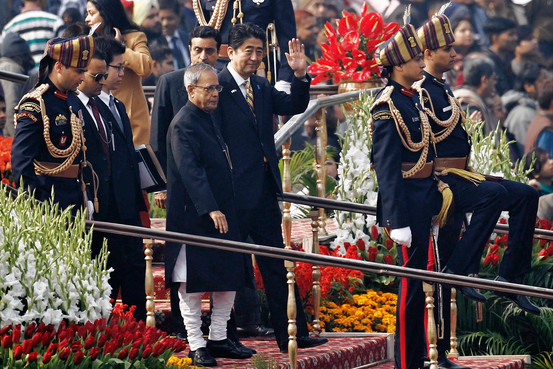Home -> News -> Media -> India, Japan Showcase Partnership on Republic Day
India, Japan Showcase Partnership on Republic Day

NEW DELHI—Japan's prime minister and India's president sat side-by-side on the reviewing stand here on Sunday as India celebrated a national holiday with a parade designed to display military strength.
It was an important show of solidarity between Asia's largest democracy and its richest as the two nations contend with an increasingly assertive, well-armed and authoritarian China.
The weekend visit to New Delhi by Japanese Prime Minister Shinzo Abe marked a significant new stage in the two countries' deepening strategic relationship as geopolitical tensions mount across Asia, diplomats from both sides said. Mr Abe was the guest of honor for festivities on India's Republic Day, which commemorates the day its constitution came into force in 1950.
Mr. Abe and Indian Prime Minister Manmohan Singh said their nations are committed to a global partnership based on "freedom, democracy and rule of law" to help maintain peace and stability amid "changes in the strategic environment."
China wasn't mentioned by name. But worries about Beijing's ambitions and its growing ability to project military power are driving closer ties between Japan and India, both of which are embroiled in territorial disputes with China.
"It is clear both countries realize there is a major challenge looming on the horizon," said Srikanth Kondapalli, an Asian security expert at Jawaharlal Nehru University in New Delhi. "India and Japan feel the need to do something, especially in the maritime-security realm."
Japanese officials said relations with India are far broader than defense cooperation. During Mr. Abe's trip, the two countries agreed to a wide range of efforts to cement economic and commercial ties, with Japan saying it is committed to helping India further industrialize.
Yet days before he arrived, Mr. Abe caused a stir at the World Economic Forum in Davos, Switzerland by comparing relations between China and Japan today to those between Britain and Germany before World War I.
Japan, backed by the U.S., has launched a diplomatic offensive to draw other Asian countries into a more united front against China, which last year declared a new air-defense identification zone seen by many as a bid to reinforce its claims over disputedislands in the East China Sea.
China's claims there and in the South China Sea, where it is butting heads with Vietnam, the Philippines and other countries, have garnered the most international attention. But China has also been active to the west, along its land border with India and in the waters of the Indian Ocean.
India has accused Chinese troops of making repeated incursions into Indian-controlled parts of the Himalayas. Beijing, which also claims those areas, denies India's allegations. The two countries fought a 1962 war over their Himalayan border.
Indian policy makers have also grown increasingly concerned about China's presence in the Indian Ocean, which India views as within its sphere of influence and which encompasses critical transit routes for shipments of Mideast oil to India as well as to China and Japan. Beijing has funded port construction in Pakistan and Sri Lanka and its navy has been more active in the region.
In December, Japan and India conducted their first bilateral naval exercise in the waters off Chennai on India's southeast coast. Two Japanese destroyers joined three Indian warships to practice anti-submarine warfare. In January, the two countries' coast guards staged joint maneuvers in the Arabian Sea.
Sunday's military parade included flyovers by the Indian air force's Russian-made Sukhoi Su-30 fighter jets and a U.S.-made C-130J Super Hercules transport plane. India recently dispatched the Hercules to a high-elevation landing strip near the Chinese border, highlighting its ability to reinforce troops there.
A wing of the advanced fighters is also set to move to a base in northeastern India closer to China, marking a reorientation in threat assessments by the Indian military, which for decades has focused largely on rival Pakistan.
Mr. Abe's weekend visit joins a series of recent high-level exchanges with India. Japan's Emperor Akihito and Empress Michiko came to India last year, and Mr. Singh visited Tokyo. Japan's defense minister also made a recent trip to Delhi.
Ties between the two haven't been weighed down with the historical baggage that, to the consternation of Washington, burdens Japan's relationships with some other Asian countries, most notably U.S. ally South Korea, and has hindered greater regional cooperation.
During World War II, when India was still part of the British Empire, many Indian troops fought on the side of the allies. But Japan supported the creation of the pro-independence Indian National Army, which fought alongside Japanese troops in some battles.
Korea, which was colonized by Japan for decades, says Japanese leaders have failed to adequately atone for the country's actions—such as forcing Korean women to serve as prostitutes in Japanese military brothels during World War II. The two countries also have territorial disputes of their own.
A visit by the newly elected Mr. Abe, a more nationalist leader than his recent predecessors, to the controversial Yasukuni Shrine, where 14 Class-A war criminals are honored along with Japan's other war dead, angered Koreans. U.S. officials are pressing Mr. Abe to pledge not to visit the shrine again.
- .U.S. Treasury looks to hold more cash to deal with future crises
- .Yum, McDonald's in Shanghai food safety investigation
- .Yellen defends loose Fed policy, says job market still too weak
- .Carl Icahn says 'time to be cautious' on U.S. stocks
- .Samsung Electronics says second quarter profit likely down 24.5 percent; worst in two years
- .U.S. jobs data seen reinforcing strong growth outlook
- .Asia stocks up on buoyant Wall Street, oil near highs

